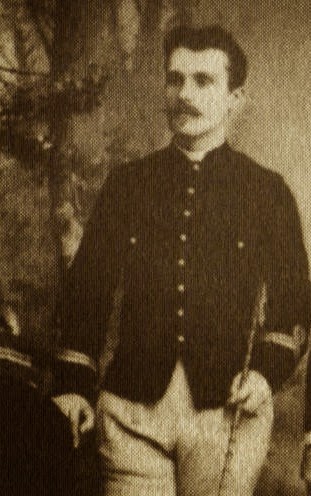It is safe to say that few people in that benighted realm the Anglosphere have ever heard of Albert Eugene De Puyou, Count of Pouvourville. In the French speaking world there are perhaps a few more, yet today he is an obscure figure. Born in 1862 into a family with an illustrious military tradition, he joined the French foreign legion and journeyed to French Indo-China where he remained most of his life. He was, in his time, one of the great French orientalists - in the best sense of the word - and was instrumental in introducing oriental spiritual traditions and customs, especially Taoism, into Europe. His military career with distinguished, and after that he took numerous administrative positions. His real interests, however, were not in advancing French interests in Viet Nam or southern China, but in oriental esoterica. He lived for decades in Tonkin (northern Viet Nam), learnt Chinese and Vietnamese, and immersed himself in the traditions of those lands. When he returned to France he published numerous studies under the name Matgioi - "eye of the day". His most accomplished works concerned the metaphysics of Taoism with which he - in contrast to the academic orientalists of his time - had a deep and first hand acquaintance. He was an associate of the great French metaphysician Rene Guenon.
His acquaintance with Taoism was, in fact, an initiated one. While serving in the First Regiment of the Foreign Legion where he attained the rank of lieutenant and was noted for several heroic deeds, he met a man named Tong Song Luat who initiated him into a semi-secret society and taught him the inner doctrines of Taoism. For a European of his time, and perhaps since, his knowledge of Taoism was unsurpassed. He wrote attacks upon academic and theosophical pretenders and spoke with authority upon the true teachings of the Tao and Taoist alchemy. His principle work was La Voie Métaphysique, 1905. He was a regular contributor to Guenon's journal Gnosis.
Regrettably, little or nothing of the works of Matgioi are available in English. Here, though, is a link to a PDF of his main work in his native French, an important work on oriental metaphysics contrasted with those of the West. It includes a profound account of the I Ching and the symbolism of its hexagrams:
His other claim to fame was his lifelong addiction to opium. He would take to the opium pipe every day. Here is a poem he wrote on the subject, translated into English by R.E.André III.
Mild regret of the morning, sweet smile of the evening,
Indifferent to praise and scorner of blame,
Gilded opium, silent counselor, nurturer
Of all of the refined pleasures that we each loved,
Director of knowledge, power, will,
Creature of concepts, fire-starter,
Older brother of sleep, father of nonchalance,
Ruler of sense, poison of hearts, sustainer of souls,
Comfort of the dreamer, hope of the continent,
Luller of cares, golden mouth of legends,
Stimulator of the fingers, titillator of glands,
Invisible emperor of hallucinatory dream,
Wine of the contrite brain and bread of the starved soul,
Black companion, secret kiss, immanent master
Come, my friend, come, my mistress, come, smoke.
[Translation from French by R.E.André III]
L’Opium
Doux regret du matin, doux sourire du soir,
Indifférent du los et mépriseur des blâmes,
Opium doré, muet conseiller, amorçoir
De tous le raffinés plaisirs que nous aimâmes,
Directeur du savoir, du pouvoir, du vouloir,
Créature de concepts, générateur de flammes,
Frère ainé du sommeil, père du nonchaloir,
Règle des sens, poison des cœurs, soutien des âmes,
Réconfort du songeur, espoir du continent,
Endormeur des soucis, bouche d’or des légendes,
Excitateur des doigts, titillateur des glandes,
Invisible empereur du rêve hallucinant,
Vin du cerveau contrit, pain de l’âme affamée,
Noir compagnon, baiser secret, maître immanent,
Viens, mon ami ; viens, ma maîtresse ; viens, fumée.
MATGIOI (Albert de Pouvourville) 'Rimes Chinoises', 1904.
Yours,
Harper McAlpine Black
L’Opium
Doux regret du matin, doux sourire du soir,
Indifférent du los et mépriseur des blâmes,
Opium doré, muet conseiller, amorçoir
De tous le raffinés plaisirs que nous aimâmes,
Directeur du savoir, du pouvoir, du vouloir,
Créature de concepts, générateur de flammes,
Frère ainé du sommeil, père du nonchaloir,
Règle des sens, poison des cœurs, soutien des âmes,
Réconfort du songeur, espoir du continent,
Endormeur des soucis, bouche d’or des légendes,
Excitateur des doigts, titillateur des glandes,
Invisible empereur du rêve hallucinant,
Vin du cerveau contrit, pain de l’âme affamée,
Noir compagnon, baiser secret, maître immanent,
Viens, mon ami ; viens, ma maîtresse ; viens, fumée.
MATGIOI (Albert de Pouvourville) 'Rimes Chinoises', 1904.
Yours,
Harper McAlpine Black


Good post on a neglected figure. Most of his works are now available online, either from the Internet Archive or Gallica. However, here is the fictionalised account of his initiation into Taoism: https://www.scribd.com/document/379269759/Matgioi-Aux-Tournants-de-la-Voie
ReplyDelete